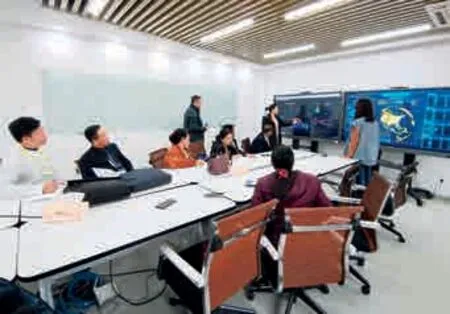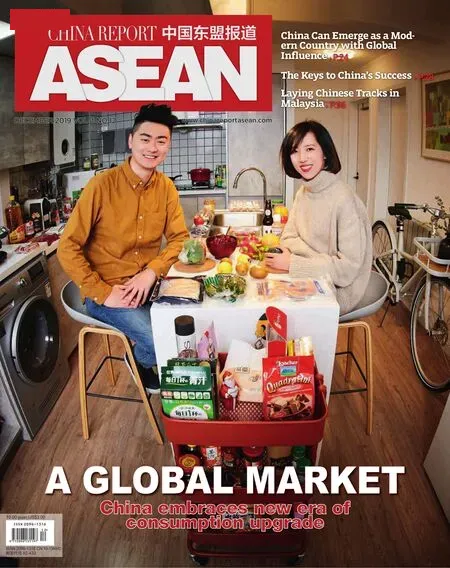MEDIA OF TOMORROW China-Myanmar New Media Seminar 2019 in Beijing

Chen Dehai,secretary-general of ASEAN-China Centre,with participants of the China-Myanmar New Media Seminar 2019.
With the refreshing early winter Beijing wind at their backs,participants of the China-Myanmar New Media Seminar 2019 exited the airport at eight o’clock in the morning.Aiming to complete a tight schedule for the seminar,they started the visit just two and a half hours later as they landed in the conference room of the ASEAN-China Centre (ACC).
“The communication inspired me considerably on new trends and future of media,and I believe we in the press are all facing the same problem in that traditional broadcasting means are limiting the development of the media industry,”explained Daw Khine Le Win,a reporter from the Myanmar Radio and Television (MRTV).She attended the seminar seeking to learn more about new media development.
Sponsored by the Embassy of the People’s Republic of China in the Republic of the Union of Myanmar and organized by China Report Press,the China-Myanmar New Media Seminar was held in Beijing from November 18 to 22.Ten participants from departments and units under the Ministry of Information of Myanmar attended.
First-hand Experience
In the Central Kitchen,the media hub of People’s Daily on the tenth floor of New Media Building,the participants took in the innovative news production and broadcasting platform integrating various forms of information including pictures,videos,audios,H5 interactive models and animated games.A giant oval desk in the media hub serves as the control center and behind it stands a wide screen.Stretching over 10 meters long,the screen displays various items in international news,public opinion,breaking reports,trending articles and news,hot topics and schedules of various correspondents.
“This is the first time I have ever seen such a modern Central Kitchen actually materialize,”exclaimed U Jt Boi Ki,awed by the platform where“technologies motivate news production.”Boi Ki revealed that the Myanmar media also has mechanisms for overall planning,but with differences from the cuttingedge Central Kitchen.Boi Ki hoped this trip would help guide his work on improving the modern operation mechanism for Myanmar media.
“One can control the Central Kitchen not only in this building,but also from PCs,tablets and smart phones,”noted U Hein Htet Lu Aung from the MRTV.“And as long as you have the internet,you can perform mobile news editing.”
Daw Khine Le Win was impressed by the business of People’s Daily Digital Communication Co.,Ltd.While most media outlets focus on broadcasting information through the“small screens”of smart phones,the company’s“big screen”concept has unique appeal.“Attracting attention is indeed an important topic for us to study.”
At the Huawei Exhibition Center in Beijing,participants gained an understanding of the tech giant’s products,solutions and projects including 5G New Technology Safe City and Smart Schools,and experienced the new conveniences afforded by such technologies.At the Big Data Center of the Communication University of China,they experienced the platform displaying real-time global news and a system that visualizes basic data of China’s movie industry.Both were developed by the university research personnel.U Bo Hla,director of the publishing house of the Printing and Publishing Enterprise,was engrossed by such innovations and technologies.“The innovation platform is eyeopening,”said U Bo Hla,“Huawei independently developed it,and I expect such high-tech products to work in Myanmar in the near future.”
“It’s impressive that these marvelous technologies and devices are all independently developed by Huawei,”opined Daw Khine Le Win.“I can feel the gap between Myanmar and China in technology and innovation.”Daw Khine Le Win was particularly amazed by the 5G fishery and smart schools promoted by Huawei.She admitted that Myanmar has a long way to go to catch up with China in education and technology.
More Cooperation Expected

Participants visit the Big Data Center of the Communication University of China.
During the seminar,experts from Sina,Tencent and the Communication University of China delivered lectures and discussed many topics including the digital reform of news production and information operation,observation of new media users in the Internet Age and corresponding measures,and ways to deal with public opinion with big data.After discussions with experts,the participants were eager to take the acquired knowledge back to share with their colleagues in Myanmar.
“New media platforms in China such as Weibo and WeChat are developing quickly and attracting millions of users to hot topics,”explained U Thura Zaw,chief correspondent of Myanmar News Agency.“It was incredible to see an AI robot produce a video program in minutes.”The journalist expressed hope that AI products would be applied in the new media of Myanmar.
At China International Publishing Group (CIPG),participants conducted communications with reporters from the Digital Media Center (DMC)and China Report ASEAN.The DMC introduced the“Foreigners on China”International Short Video Competition,invited Myanmar media cooperation and displayed videos produced by the DMC.China Report ASEAN outlined its development in all-media reporting,especially experience in Myanmarlanguage social media and short videos for foreign communications.CIPG is expecting more cooperation with Myanmar media.

Participants try shooting a short video at the Digital Media Center of China International Publishing Group.
“While flipping the pages of China Report ASEAN,I saw photos of Chinese late Premier Zhou Enlai with U Nu,former Prime Minister of Myanmar,”revealed U Thura Zaw.“The photos were taken not long after China and Myanmar established diplomatic relations,and next year is the 70th anniversary of that event.We hope to cooperate and share media resources with Chinese media and report on more friendly cooperation between the two countries.I would even commit to a term working in Chinese media.”
“I oversee the broadcasting of global news at the MRTV,and I was deeply touched to see Chinese media produce short videos in the Myanmar language,”beamed U Hein Htet Lu Aung.“The Chinese media produced many good short-video programs,and I hope to see more news products from China because they all help understand more about China’s culture and society.”
“The MRTV is also looking to apply new media such as social media slowly but surely,”commented Daw Khine Le Win.“This experience has provided excellent ideas,and I think this visit has been tremendously helpful for our future work.”
“China and Myanmar need cooperation in media development,and Myanmar has a lot to learn from China in dealing with breaking news,”stressed U Myo Min Aung,editor with the Information and Public Relations Department.“When confronted with overwhelming online public opinion stirred by breaking news,the Chinese media can guide public opinion correctly and quickly and hold press conferences before the spin.These moves are all worth learning.”
“We are very thankful for the Chinese Embassy’s invitation to the seminar—the visit to China has been quite fruitful,”grinned Daw Kyi Mon from the Information and Public Relations Department.“We came from different positions in different cities such as Rangoon,Naypyidaw and Mandalay,but all of us want to share this experience with our colleagues and tell Myanmar people about the development of China’s new media and society.”
- China Report Asean的其它文章
- BINGE BUYING IN NUMBERS Online shopping-driven economics
- FLAGSHIP OF BRUNEI-CHINA COOPERATION A refinery and petrochemical plant begins commercial operation in Brunei
- EMPOWERING REMOTE INDONESIA Chinese-funded power plant helping boost development in isolated regions of Indonesia
- GROWING MARKET FOR IMPORTS The considerable potential of the Chinese consumer market is alluring goods from around the globe
- DAWN OF AN ERA OF NEW CONSUMPTION
- SHARING REAL CHINA A journey of discovery by mainstream ASEAN media

